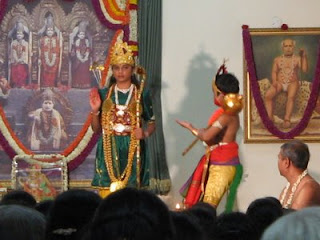Dashavatar is also known as 'Dahikala', From last 600-700 years Dashavatar is a part of our culture.
Dashavatar is Most popular art form in Malvan. Dance ritual dramas are held in most of the temples during festive occasions. interesting characters in these dramas are Apsaras (Heavenly maidens) Their role in woman's attire are played by the men.
Credit of this new art, goes to pioneer Mr. Shymnaikji Kale who introduced Dashavatar in 11th century
A from called Aatdashavatar is also highly appreciated by the locals. It is presented in two parts. Parts I begins with Ganeshstavan, Saraswatistavan, Brahmin priests entry and killing of Sankasura (Purvarang) while part II is a proper play and includes mythological stories. (Uttarang or leelantya)
The first incarnations Matsya Avatar is presented to the audience in the theatre. The myth beginnings with Lord Brahma who is busy in penance. The demon named Sankasura seizes this opportunity to steal his Vedas & Shastras ( the holy Books). Lord Vishnu who is witness to this incident then promises Brahma of bringing back his Vedas. Vishnu wanders in search Sankasura and when he finds him, fierce battle takes place between them. Sankasura runs from the battlefield and hides under water in a conch shell. As Vedas remained drowned in water, it was necessary to bring them up. To retrieve them Vishnu descends into the water in the form of fish that is lower part of body like fish and upper part like that of a man (A Matsya Avatar) in a Bottle under the Water Vishnu finally defeats Sankasura who surrenders and explains the motive behind stealing of Vedas. That he did so with an intention to pass philosophical knowledge of Vedas from elite people to down –trodden society (Bahojan Samaj) Vishnu appreciated Sankasura's courage and gave him a vow that in the tree worlds (Trailokya), so before worshipping Vishnu people will worship his conch shell. Vishnu then restored the Vedas to Brahma.
In Indian mythology the ten incarnations of lord Vishnu is collectively known as Dashavatar. They are Matsya (Fish) Katchha (Turtle), Varaha (Boar), Narsimha (half man half Lion), Waman (A Brahman boy), Parshuram , Rama, Krishna, Buddha ; Kalanki.
Dashavatar is Most popular art form in Malvan. Dance ritual dramas are held in most of the temples during festive occasions. interesting characters in these dramas are Apsaras (Heavenly maidens) Their role in woman's attire are played by the men.
Credit of this new art, goes to pioneer Mr. Shymnaikji Kale who introduced Dashavatar in 11th century
A from called Aatdashavatar is also highly appreciated by the locals. It is presented in two parts. Parts I begins with Ganeshstavan, Saraswatistavan, Brahmin priests entry and killing of Sankasura (Purvarang) while part II is a proper play and includes mythological stories. (Uttarang or leelantya)
The first incarnations Matsya Avatar is presented to the audience in the theatre. The myth beginnings with Lord Brahma who is busy in penance. The demon named Sankasura seizes this opportunity to steal his Vedas & Shastras ( the holy Books). Lord Vishnu who is witness to this incident then promises Brahma of bringing back his Vedas. Vishnu wanders in search Sankasura and when he finds him, fierce battle takes place between them. Sankasura runs from the battlefield and hides under water in a conch shell. As Vedas remained drowned in water, it was necessary to bring them up. To retrieve them Vishnu descends into the water in the form of fish that is lower part of body like fish and upper part like that of a man (A Matsya Avatar) in a Bottle under the Water Vishnu finally defeats Sankasura who surrenders and explains the motive behind stealing of Vedas. That he did so with an intention to pass philosophical knowledge of Vedas from elite people to down –trodden society (Bahojan Samaj) Vishnu appreciated Sankasura's courage and gave him a vow that in the tree worlds (Trailokya), so before worshipping Vishnu people will worship his conch shell. Vishnu then restored the Vedas to Brahma.
![]()
If you like this please Link Back to this article...

















0 comments:
Post a Comment
Note: Only a member of this blog may post a comment.